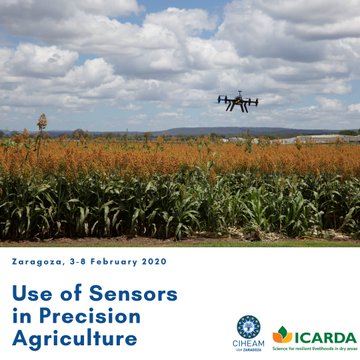 3-8 February 2020. Zaragoza, Spain. Agriculture 4.0 offers innovative solutions to make production
3-8 February 2020. Zaragoza, Spain. Agriculture 4.0 offers innovative solutions to make production environmentally, economically and socially viable but in many countries the successful implementation of many of these technologies is still a challenge.
Food production must increase by 70% in order to feed a world population that is expected to reach 9.6 billion by 2050. This challenge is even greater when we take into account the low increase rate of available land, the effects of climate change on agricultural production and the societal demand for decreasing the impact of agriculture on the environment. To achieve a more rational, competitive and environmentally friendly production of food and biomass, a change in farm management is required and precision agriculture is part of the solution.
Precision agriculture (PA) is the management of spatial and temporal variability to improve economic returns and reduce environmental impact. PA technology makes it possible to log data of soil and crop properties at even centimetre level across an entire field. Although most people can see the benefits of using a more
Training in the use of tools and technologies and a deeper analysis of successful implementation can enhance adoption. Sensors play a crucial role in PA. They are the key for collecting data in a more efficient way in order to make the most appropriate management decisions.
The objective of this course was to deliver knowledge about different aspects of sensors, how to use them and how to integrate their data into the decision making process. The focus was on the specificities of the Mediterranean agriculture.
Programme
- An overview of the role played by sensors in PA.
- Knowledge of the large range of different sensors and their possibilities and limitations.
- Better understanding of sensor common principles and technical implement requirements. – Criteria to choose the appropriate technology and strategy for monitoring the required parameters under different conditions.
- Experience on current sensor system technology successfully implemented for different purposes and situations.
- Hands-on experience in sensor operation and in-field data acquisition.
- Skills for sensor data processing and integration of the derived information into the farm management information system.
- Awareness of the economic issues involved in the implementation of PA.
- An overview of emerging sensor technologies and future developments.
Related:
L'intérêt du secteur privé pour des capteurs innovants pour l'agriculture.
Interview avec Prof. M. Hachicha National Research Institute in Rural Engineering, Water and Forestry, University of Carthage | UCAR
- Quel est le défit des capteurs actuels?
- Quel est l'intérêt des compagnies Européennes?
- Comment les start-ups Tunisiens peuvent ils bénéficier d'une nouvelle génération de capteurs?
- Est-ce que cela peut également avoir des retombées sous-régionales?
- Est-ce que ces capteurs peuvent également être utilisés pour les plantes? - Comment cela peut bénéficier le petit producteur?
- Quel système de subside pourrait être utile au petit producteur?



No comments:
Post a Comment